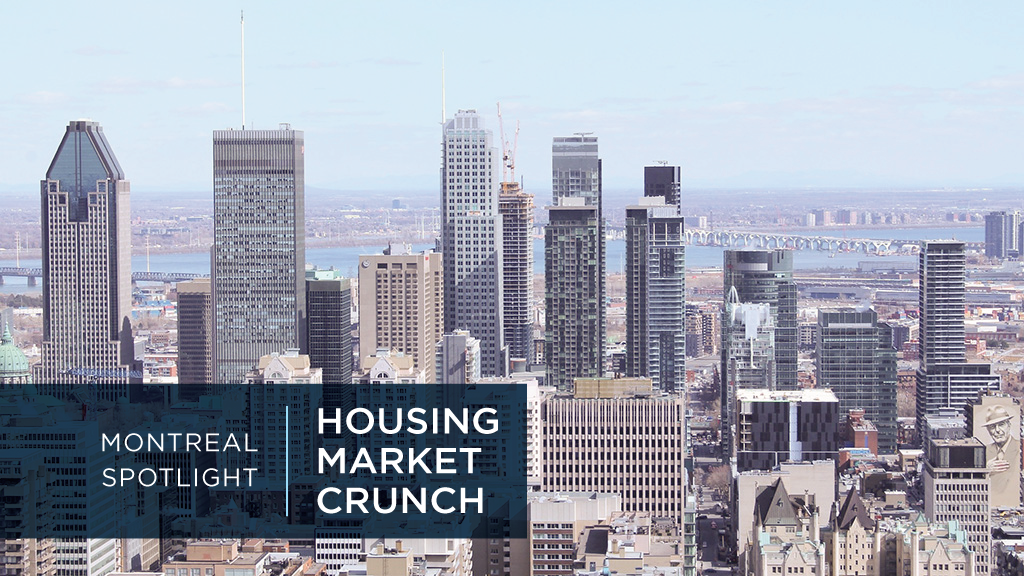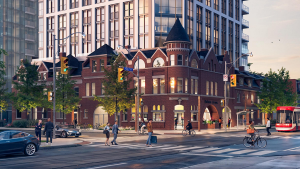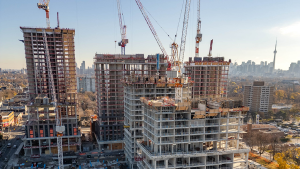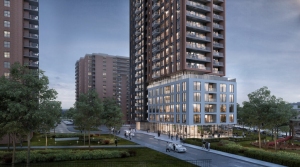The Montreal housing market has seen a sharp increase in rental construction versus single-family homes, driven by simple economics.
According to CMHC market analyst Francis Cortellino, it’s a trend that has been ongoing for 20 years.
“Not a lot of land is available, and land is expensive, so there’s not a lot of single-family homes being started,” he said.
Add to this factors like tough zoning regulations where municipalities purposely “want to increase density.”
There is also less family formation.
In fact, last year saw “the lowest point — 1,600 starts — since we recorded data” for new single-family homes, Cortellino said. For rentals it was 9,600 starts.
Condos have also taken a hit, with construction last year the lowest since 2001 at 3,800 starts.
“So, you can see there’s a huge gap between home ownership and rentals and also condos and rentals,” he said.
The condo picture has also flipped.
Ten or more years ago condo starts were exploding. From 2010 to 2014 some 11,000 units were being built each year. That compared to 1,800 rentals. By contrast from 2018 to 2023, 6,700 condos annually were added but 13,000 rentals. And, said Cortellino, “The gap is getting bigger and bigger.”
This, he added, is different from condo development in other Canadian cities.
“There are some (Montreal) investors buying condos to rent out like in Toronto and Vancouver but they’re not as important a share.”
The reason for the condo drop-off was simply lack of sales in an overbuilt market. By 2014 there were “around 3,000 condos built but unsold which was historically high for Montreal,” Cortellino said.
Yet, despite the significant increase in new starts, the rental market is still under pressure as elsewhere in Quebec and Canada.
In 2023 the vacancy rate for purpose-built rentals was 1.5 per cent versus condo rentals at 1.3 per cent, “one of the lowest” in two decades, CMHC’s new rental market report stated.
The average two-bedroom rent for purpose-built was $1,096 versus $1,642 for rented condos. There was a 7.9 per cent rent increase for an average purpose-built rental.
Like elsewhere in Canada, international migration is a challenge.
“Most of these people tend to rent when they arrive in the country,” and home ownership affordability is another hurdle.
Rental vacancy rates, while low, vary somewhat across Montreal, the lowest being in neighbourhoods like The Plateau (0.6 per cent) and the highest downtown (3.2 per cent).
Montreal, for various historical and social reasons, has traditionally been a renter’s market. It also has among the highest housing density, such as multi-storey buildings, in the country.
While contemporary rental starts are booming, Cortellino suggested it’s a myth the city is still dominated by renters compared to the rest of Canada.
Factoring out immigration, the percentage of renters is pretty much the same among Montreal, Toronto and Vancouver. Yes, 47 per cent of all households in 2021 rented compared to 35 per cent in Toronto and 38 per cent in Vancouver. But looking at non-immigrants, such as a couple with or without children, Montreal and Toronto had exactly the same rate of renters — 24 per cent — and Vancouver had more at 30 per cent.
Meanwhile, housing starts overall last year were at their lowest since 2001.
Some 1,021 single family starts were recorded, a massive drop from 2,899 just two years earlier. The resale market was also considerably lower at just over 36,000 compared to 54,000 in 2021. Interest rates and inflation are the chief culprits, CMHC says.
Immigration, interest rates and available labour are certainly factors thwarting builds but there are embedded issues like zoning and obsolete regulations.
Gabriel Giguère, a public policy analyst with the Montreal Economic Institute, said too many municipalities still have “a classical view” of single-family housing and are resistant to multi-unit dwellings.
“They may need to be sensitized to this need for densification.”
Stéphanie Lapierre, principal economist with the Quebec Professional Association of Real Estate Brokers, said other factors are people returning to the city post-pandemic and the reluctance of seniors to downsize because they want to “grow older in their house,” a trend CMHC says is “more prevalent in Montréal than in other major Canadian cities.”
Avi Friedman, professor of architecture at McGill University, blamed city hall for misfiring on affordable housing.
There is the city’s so called 20/20/20 (social/affordable/family) housing goal mandated for new developments.
“But hardly any builders will bid on that premise,” Friedman said. “In general builders are buying their way out of this scheme and instead building regular housing.”
Apparently recognizing that, in March the city made some adjustments, these include the temporary exemption of smaller projects up to 20 units.










Recent Comments